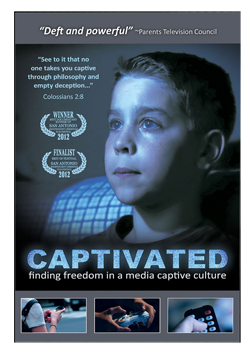
I had the opportunity to review the intriguing Captivated DVD documentary from Media Talk 101.
WHAT IS IT?

The Captivated DVD is a documentary film that highlights the increasing dependence our society has on various forms of media, from television to cell phones, computers to tablets, to video games. Everywhere we look, people are engrossed or “captivated” by their digital devices.
Are our relationships with people suffering because of the time and attention we give to media? Are we being unduly influenced by worldly sources? Are we using these devices as tools in a modern world, or are they taking over our focus?
This film helps us answer these questions and more and also forces us to examine our own use of media and to consider whether or not we put it in its rightful place or give it a unjust priority over opportunities for spiritual growth in our lives.
You can watch a large number of video excerpts from the film and see for yourself if this documentary could be important in your life and the lives of loved ones around you.
This DVD is intended for adults. You can purchase it for just $16.95 with free shipping. They are also offering a special sale right now where you can order 2 and have the second copy to give away to a friend for just an extra $5 with free shipping. Now that’s a deal!
This film is 1 hour 47 minutes long and includes an additional 2 hours of bonus features.
OUR EXPERIENCE:
I have to admit that when I first heard about this film, I didn’t think I’d be interested. I watched the trailer, and I still wasn’t convinced. But once I sat down and watched each and every video excerpt available on the website, I became more and more intrigued, and I was certain it was worth investigating further. I’m so glad I did!
I invited over a close Christian friend for tea, and we sat down and watched the film together. Wow! We had wonderful discussions throughout the film, even pausing it several times to talk more about it. We watched all of the bonus interviews on the DVD, as well, and it was all so worth our time! We both found ourselves nodding in agreement throughout the film. It definitely sparks some self-examination and gets you thinking about how the use of media impacts your own family.
There’s so much to tell about this film. I took lots of notes as I watched it, and I think the best way to summarize it for you is to highlight some of the many points that jumped out at me as important.
The movie starts out introducing how we began using media in the first place…with the telegraph. Suddenly, people found they could share thoughts and tidbits of news across the miles without having to wait days or months to get their messages through. It literally changed the way people communicated, and it allowed families spread out in distance to stay close through this type of contact.
One of the first good points of the film was how introducing busy programming on television to very young children actually conditions their brains to need excessive stimulation in order to generate interest, and this in turn develops a shortened attention span as they get older. This really caught my attention, because I have a kid with ADHD and two others who really struggle with their attention span for things that are not visually stimulating (like school work…go figure!).
Another good point was that the brain gets good at whatever it does most. So if kids spend their time playing video games, they get very good at them. But if they spend their time reading books or playing board games, they get very good at those things, as well.
While we’re on the topic of video games, here’s something else to consider. Your brain, when it works hard to accomplish a task, derives pleasure from a job well done and a sense of accomplishment at reaching a goal. But scans of the brain show that playing video games also stimulates the pleasure center in the brain, bypassing the part where it works hard to get the sense of accomplishment. So essentially, it tricks your brain into having strong feelings of having accomplished a lot on a difficult task without actually working hard, so you get a false sense of accomplishment with the same gratifying feelings of pleasure. Also, the film states that 10% of children are actually physically addicted to video games, and in a clinical sense, it parallels that of a gambling addiction. That’s a scary thought! Do we want our children crippled with dependency in this way?
I mentioned that I have a child with ADHD. I chose not to medicate. I homeschooled him until high school when he had developed more self-control, and I kept his life very routine and regimented so he could focus better at home. The film talks about how often times, children with ADHD can become more regulated and avoid medication by disconnecting them from media, ensuring they get sufficient sleep, having plenty of outdoor activities, and ensuring they have good nutrition.
It also discussed how the Hollywood rating system for films created the “R” category, which allowed movies that would never before have been allowed in theaters to now be shown with the “rated R” label. In fact, there are now twelve times more R-rated films than G-rated films being made each year, and that is largely driven by the money generated by the popularity of these films with questionable content that our grandparents would have found shameful. Over time, people become desensitized to shocking content so that foul language, violence, and adult situations are no longer shocking.
Many people have unknowingly become enslaved by media. How many times have you been in line at the grocery store while someone stands at the checkout pecking away at their phones or rudely carrying on a phone conversation in front of the cashier? What about texting in church or at the dinner table? Do you have friends who panic if the power goes out and they can’t get on the computer? Do you children dread vacationing in remote locations where they have to be disconnected from media for a while? Do they know what else they can do with their time? I know my own family suffers from some of these same maladies at times. It can be a tragedy if one of the kids fails to charge their tablet and finds that the battery is dead…real tears!
Also, we should consider more closely what messages are being communicated through the television, music, and internet sources we choose. Countless sources communicate the ideas of man and not of Christ. Philippians 4:8 says “Finally, brothers and sisters, whatever is true, whatever is noble, whatever is right, whatever is pure, whatever is lovely, whatever is admirable—if anything is excellent or praiseworthy—think about such things.” Are those the ideas that linger in our minds through the media we’re accessing?
Without media, you have more time for other things in your life…to learn, to do, to interact with others in a meaningful way, and most importantly, to spend time in God’s word. Do you catch yourself saying you don’t have time for bible study? Could you skip Facebook today and immerse yourself in the bible instead? Are we making right choices in how we spend our time?
The film also points out that television was once a family-oriented activity where parents were ultimately in control of what their children watched. Most homes had only one tv in a central location, and children watched whatever their parents were watching. I remember that in my own childhood home, and I remember that my parents didn’t always shelter me from questionable content in the programming, but instead, used it as an opportunity to discuss with me the situations that I’d encounter in the world and how to handle them or what better choices could be made in a similar situation. Do we do that with our children now, or do we give them their own televisions in their rooms and just assume they are watching something appropriate?
Instead, we need to control the medium, not the other way around. Be selective in what you watch and the messages you stream into your mind through video and music. Use television as a opportunity to discuss things with your children that conflict with your Christian values.
The overall message I got from the film were that if we don’t allow ourselves to be captivated by the messages of this world, then it means we can strive to be captivated by something else that glorifies God. Media sources and digital devices can be wonderful tools in living a godly life. The key to it all is discernment. And that’s the message I think this film drives home to viewers.
What captivates you? Ask yourself that question as you watch this film, and you’ll be glad you took the time to examine yourself. The first thing my friend said when it was over was that she wanted to get the film for herself and watch it again with her husband. Its message is too important to ignore. I highly recommend it!
See what other Crew members had to say about the Captivated DVD by clicking the banner below.


No comments:
Post a Comment